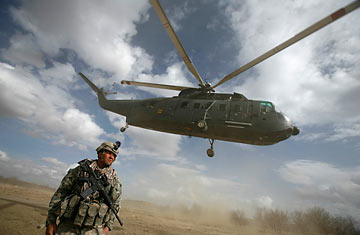
You know the government's broken when, in the face of tough fiscal times, the President freezes government spending but gives the military a pass. That's because spending on the military and homeland security, following 9/11 and the launch of two wars in its wake, has become sacrosanct. But it's too bad — because there is plenty of money to be saved by lopping off the well-marbled fat that clings to the $700 billion the U.S. spends annually on national security.
The U.S. military is now spending more on defense, on average, than it did during the Cold War — even after the costs of the wars in Afghanistan and Iraq are erased.
Let's repeat that: even without a superpower rival like the Soviet Union — with its arsenals of nuclear weapons, fleets of tanks and armadas of warships, all manned by 10-foot-tall Red Army troops — the U.S. is now spending more preparing for war against, well, who knows, than we spent readying to fight Moscow. And the Obama Administration has made it clear that defense spending is going to continue to increase, even as fiscal pressures — for bailouts, health care, infrastructure — inexorably mount.
As far as the eye can see, U.S. taxpayers will be spending one-third more to maintain the U.S. military than their parents and grandparents paid for the nation's Cold War force.
To be sure, it would be difficult to hack away at the funds needed to wage the wars in Afghanistan and Iraq. Yet military spending today is 41% more than it was in 1998, not even counting the billions earmarked for the wars. The cost of a standing military, after eliminating inflation's impact, has soared to $459,000 per trooper — 78% higher than during President Reagan's defense buildup, 95% higher than in 1989 and three times the Vietnam-era average, according to a recent study by the liberal-leaning Project on Defense Alternatives.
Playing fiscal detective to track down the logic for the hike is unsatisfying. "Washington opened the sluice gates of military spending after the 9/11 attacks primarily not because it was the appropriate thing to do strategically but because it was something the country could do when something had to be done," military scholar Richard Betts wrote in Foreign Affairs in 2007. Neither Presidents nor lawmakers want to be branded unpatriotic by trying to cut defense spending, a non sequitur if there ever was one. Many lawmakers cloak their advocacy for hometown weapons production in such red, white and blue bunting.
Few are calling for cuts. One of the rare lawmakers willing to criticize Obama's decision not to freeze military spending is House Speaker Nancy Pelosi. "I don't think that we have to protect military contractors," she said after Obama made national-security spending off-limits. "I do not think the entire defense budget should be exempted."
But don't look for any major changes that might restore Pentagon spending to its more modest Cold War levels. Defense Secretary Robert Gates took a good whack at unneeded weapons systems in last year's budget, killing the F-22 fighter and other programs of dubious merit. Unfortunately, his minions seem to believe that this one-time slice is sufficient. Ashton Carter, the Pentagon's top weapons buyer, said Feb. 17 that he believes last year's cuts mean that additional program cancellations "won't be necessary."
